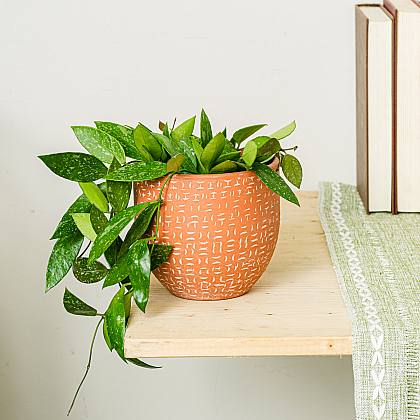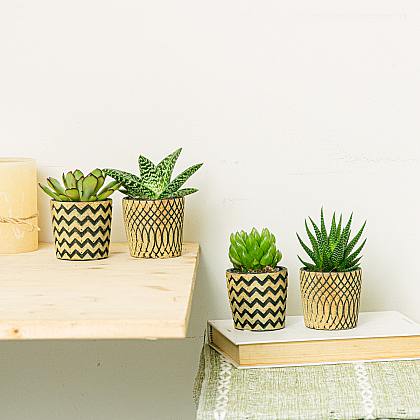Find out how self-watering technology can help care for your plants
Find out how self-watering technology can help care for your plants. In this article, we'll explore the importance of taking care of our plants and how self-watering technology can make this process easier
Find out how self-watering technology can help care for your plants. In this article, we'll explore the importance of taking care of our plants and how self-watering technology can make this process easier. We will explain what this technology is and how it works, as well as the advantages of using self-irrigation systems at home. In addition, we will give you tips on choosing the right system and recommend some ideal plants for automatic watering. You will also learn how to save water with this technology and how to maintain and care for self-irrigation systems. Don't miss it!
The Importance of Taking Care of Our Plants
Taking care of our plants is of vital importance to maintain a healthy and harmonious environment in our home. In addition to beautifying our spaces, plants play a critical role in purifying the air, absorbing carbon dioxide and releasing oxygen. They also help regulate humidity and reduce dust in the environment. In addition, taking care of our plants allows us to connect with nature and gives us a sense of well-being and calm. It's important to note that each plant has different needs for water, light, and nutrients, so it's critical to know them and provide them with proper care. Regular watering, proper pruning, pest removal, and nutrient supply are all essential aspects of ensuring the healthy growth of our plants. In short, taking care of our plants not only improves the aesthetics of our home, but also contributes to our overall health and well-being.
What is self-watering technology and how does it work?
Self-irrigation technology is a system that allows plants to be watered automatically, without the need for human intervention. This system is based on the use of sensors and devices that control irrigation efficiently. The way it works is simple: the sensors measure soil moisture and send that information to a central device, which is responsible for activating or deactivating irrigation as needed. In addition, this system can also be programmed to water at specific times, making it easy to use in homes and gardens. Self-watering technology uses different methods to deliver water to plants, such as dripping or spraying. This allows for even water distribution and prevents waste. By using this system, you not only save time and effort on manual watering, but also ensure an adequate supply of water for your plants, contributing to their health and growth. Importantly, self-watering technology is not only limited to watering plants, but can also control other aspects such as temperature or lighting. In short, self-watering technology is a practical and efficient solution to take care of our plants automatically and ensure their well-being.
Advantages of using self-irrigation systems at home
Self-watering systems are a practical and effective solution to keep our plants healthy and beautiful. One of the most important advantages is the convenience they offer, as it is not necessary to keep an eye on the daily watering of each plant. In addition, self-watering systems save time and energy by eliminating the need for manual watering.
Another advantage is the precision in the water supply, which ensures that the plants receive the right amount of water and nutrients at all times. Self-watering systems also help prevent over- or under-watering, which can be detrimental to the health of our plants.
Self-watering systems are ideal for those who have a busy lifestyle or travel frequently, as they can be programmed to water plants automatically at specific times. This ensures that the plants are always well cared for, even when we are not at home.
Another important benefit of self-irrigation systems is water savings. These systems are designed to water plants only when needed, avoiding unnecessary water waste. This is especially important in regions where water is scarce or expensive.
In summary, using a self-irrigation system at home has multiple advantages, such as convenience, precision in irrigation, time and energy savings, ease of programming, and water savings. By choosing a system that is suitable for our needs and following a few simple tips for its maintenance, we can ensure that our plants are always healthy and beautiful.
Tips for Choosing the Right Self-Watering System
When choosing the right self-watering system for our plants, it's important to consider a few key factors. First of all, we must evaluate the size and type of plants we are going to water, since not all of them require the same amount of water or have the same moisture needs. It is also important to consider the climate and location where the plants are located, as this can affect the frequency and amount of watering needed. Another factor to take into account is the available budget, as there are self-irrigation systems with different characteristics and prices. In this sense, it is advisable to look for options that are efficient and durable in the long term, avoiding investing in systems that may be costly and ineffective. Finally, it is important to pay attention to the ease of use and maintenance of the chosen system, as this can influence its durability and effectiveness. In general, it is recommended to look for self-watering systems that allow easy and simple control of the amount of water supplied to the plants, as well as options that include additional features such as timers or humidity sensors. By following these tips, we will be able to choose the most suitable self-watering system for our plants and ensure their care and healthy growth.
Ideal Plants for Automatic Watering
When choosing plants for automatic watering, it is important to consider their adaptability to different types of weather and their ability to absorb the right amount of water. Ideal plants for self-watering are those that have a high tolerance for moisture, such as begonias, ferns, and peace lilies. These plants are also well suited to shade and can be grown indoors or outdoors. Other popular choices include succulent plants such as cacti and succulent succulents, as they require very little water and can survive in extremely dry conditions. For those who prefer flowering plants, African daisies and petunias are good choices for self-watering, as they have high resistance to disease and harsh weather conditions. Herbs are also a great choice, as many of them, such as rosemary and thyme, are drought-resistant and require very little maintenance. When choosing plants for automatic watering, it's important to remember that each species has different needs for water and sunlight, so it's important to do your research on each plant before making a final choice. Additionally, be sure to select plants that are compatible with the automatic watering system you have chosen to ensure healthy growth and optimal system efficiency.
How to save water with self-watering technology
Automatic watering is a great option to take care of our plants efficiently, but it can also help us save water. How does it work? Self-watering technology allows watering to be programmed based on the specific needs of each plant, meaning that only the necessary amount of water will be used at the right times. In this way, water waste due to overwatering or forgetfulness in manual application is avoided. In addition, some self-watering systems include sensors that measure soil moisture and ambient temperature to adjust the amount of water needed in real time.
To save even more water, it's important to choose plants that are well suited to the climate and soil type where they're found. For example, native plants are ideal because they are accustomed to local conditions and require less water and special care. It is also advisable to group the plants according to their watering needs, creating specific areas within the garden or orchard.
Another useful water-saving tip is to regularly check your self-watering system for potential leaks or malfunctions. It is important to perform proper maintenance and clean the filters regularly to ensure a constant flow of water and prevent clogging. In short, self-watering technology can be a great ally to take care of our plants and save water at the same time, as long as it is used correctly and attention is paid to its maintenance.
Maintenance and care of self-irrigation systems
The maintenance and care of self-watering systems is essential to ensure their proper functioning and prolong their useful life. Here are some practical tips to keep these systems in optimal condition. First and foremost, it's important to regularly check your pipes and water lines to make sure there are no blockages or leaks. It is also recommended to regularly clean the filters to prevent sediment build-up and maintain a steady flow of water. Another aspect to take into account is the control of watering time, as each plant has different water needs. Timers need to be adjusted according to the seasons and weather conditions. Additionally, it is critical to check the condition of the valves and sensors to ensure that they are working properly. If any problems are detected, the defective part should be repaired or replaced as soon as possible. Finally, it is important to perform regular maintenance of the system in general, such as checking the water pumps, cleaning the emitters, and checking the water level in the tank. By following these simple tips, you will be able to enjoy the benefits of self-watering technology and keep your plants healthy and beautiful for a long time.
Self-watering technology is presented as an innovative and efficient solution to take care of our plants at home. Through automatic systems that control the amount of water needed, we can ensure proper irrigation without wasting resources. In addition, this technology allows us to save time and effort by not having to manually water our plants. However, it is important to choose the right self-watering system and maintain it correctly to ensure optimal operation. It is also essential to consider what types of plants are ideal for this type of watering. However, beyond the practical advantages offered by self-irrigation technology, we must reflect on the importance of caring for and valuing the nature that surrounds us. In an increasingly technological world, we must not forget the connection we have with plants and how we depend on them for our well-being. By implementing self-irrigation systems, we are contributing to the care of the environment by saving water and avoiding waste. However, we must also remember that plants need constant attention and care, regardless of the technology we use. It is critical to be attentive to their needs and give them the love and care they deserve. Self-watering technology can be a useful tool, but it should never replace our responsibility as stewards of nature


